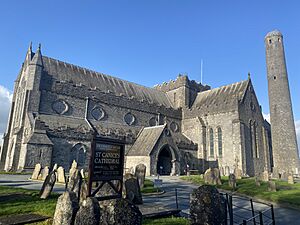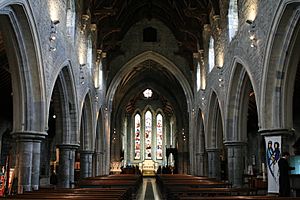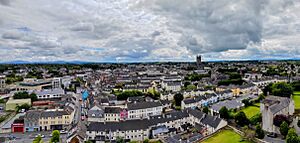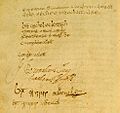St Canice's Cathedral facts for kids
Quick facts for kids St Canice's Cathedral |
|
|---|---|
 |
|
| 52°39′24.40″N 07°15′25.72″W / 52.6567778°N 7.2571444°W | |
| Location | County Kilkenny |
| Country | Ireland |
| Denomination | Church of Ireland |
| Previous denomination | Roman Catholic |
| Website | https://www.stcanicescathedral.ie/ |
| History | |
| Dedication | St. Canice |
| Architecture | |
| Style | Gothic |
| Years built | 13 century (between 1202 and 1285) |
| Specifications | |
| Bells | 8 |
| Administration | |
| Archdeaconry | Ossory and Leighlin |
| Diocese | Cashel and Ossory |
| Province | Dublin |
St Canice's Cathedral (Irish: Ardeaglais Naomh Cainneach), also known as Kilkenny Cathedral, is a historic cathedral of the Church of Ireland in the city of Kilkenny, Ireland. A cathedral is a large and important church that serves as the main church for a region called a diocese.
This beautiful building was built in the 13th century. It is the second longest cathedral in Ireland. Next to it stands a 100-foot tall round tower from the 9th century. The cathedral is named after St. Canice, an important religious figure from long ago.
Contents
The Cathedral's Long History
The spot where St Canice's Cathedral stands has been a place of Christian worship for over 1,400 years. The city of "Kilkenny" gets its name from the Irish Cill Chainnigh, which means "Church of Canice."
From a Monastery to a Cathedral
The story begins in the 6th century when St. Canice is said to have founded a monastery here. The first church was likely made of wood. Later, a stone church was built in the Romanesque style.
The current cathedral was started in the 13th century. It was built in the grand Gothic style. At that time, Kilkenny was the capital of the Kingdom of Ossory. The church became the main cathedral for the area.
Ancient Irish history books, like the Annals of the Four Masters, mention Kilkenny. They record that "Ceall-Cainnigh was for the most part burned" in 1085. This shows that a settlement and church existed here long ago.
Changes During the Reformation
In the 16th century, a major change called the Reformation happened. The Church of Ireland separated from the Roman Catholic Church. St Canice's Cathedral became part of the Church of Ireland, which is a Protestant church.
Most people in the area remained Roman Catholic. They had to find other places to worship. Much later, a new Catholic cathedral, St Mary's Cathedral, was built in Kilkenny.
Exploring the Cathedral's Architecture
St Canice's Cathedral is built in the shape of a cross, which is called a cruciform plan. It was built in the Early English Gothic style using local limestone. The outside walls have battlements, like a castle.
Inside, you can see high, pointed arches that lead from the main hall (the nave) into the choir and the side sections (the transepts). The nave is lined with five beautiful columns made of black marble on each side.
The cathedral is famous for its many stained glass windows. The large east window is a copy of the original 13th-century one.
The Famous Round Tower
The 9th-century round tower is one of the most special features of the cathedral. It is 100 feet tall. It is one of only three medieval round towers in Ireland that you can still climb to the top.
Long ago, these towers were used as watchtowers and as safe places to go during an attack. From the top, you get an amazing view of Kilkenny and the countryside. To get up, you have to climb a steep set of ladders inside the tower.
Treasures and Tombs Inside
The cathedral is filled with amazing historical objects and monuments.
Ancient Tombs and Memorials
St Canice's contains some of the finest 16th-century tombs in Ireland. Important people have been buried here for centuries. You can find memorials for bishops, powerful nobles from the House of Ormonde, and even regular people like shoemakers.
In the north transept, you can see the ancient Chair of St. Kieran. It is made of carved stone and is still used today to enthrone the Church of Ireland bishops of the area.
The Red Book of Ossory
A famous book called the Red Book of Ossory is connected to the cathedral. Around the year 1324, a bishop named Richard de Ledrede wrote sixty Latin poems in it. He wanted the priests and singers at the cathedral to sing these religious songs instead of non-religious or rude ones.
St. Canice's Library
The cathedral also has a library that was started in 1693 by Bishop Thomas Otway. It holds many old religious books and documents from the 17th and 18th centuries. To keep them safe, many of these important items have been moved to other libraries for expert care.
Notable People Buried Here
Many important figures from Irish history are buried in the cathedral or have memorials here.
- The 2nd Earl of Ormond (1331–1382)
- The 8th Earl of Ormond (c.1467–1539)
- The 10th Earl of Ormond (1531–1614)
- The 11th Earl of Ormond (1559–1632/3)
- David Rothe (1573–1650), Roman Catholic Bishop of Ossory (a memorial, his body is buried elsewhere)
- Griffith Williams (1589?–1672), Bishop of Ossory
- Hugh Hamilton (1729–1805), Bishop of Ossory
- Denis Pack (1772–1823), a high-ranking general in the British Army
Images for kids
See also
- List of abbeys and priories in County Kilkenny.
- Bishop of Cashel and Ossory
- Dean of Kilkenny
 | Bessie Coleman |
 | Spann Watson |
 | Jill E. Brown |
 | Sherman W. White |









